Hi ! We hope this site helps you! ٩(ˊᗜˋ*)و As an Amazon Associate, we earn from qualifying purchases without additional cost. Click to read more about our Privacy Policy or Affiliate Disclosure
You can just memorise the set-phrase, use it in a proper situation and amaze all the Japanese you’ll meet ! Wohoo! And we will teach you the magic word in Japanese. Using this word, you should be able to get almost anything you need in Japan!
Let’s start with the most basic, daily greetings!
DAILY GREETINGS

In the morning we say… おはようございます – OHAYOU GOZAIMASU
Adding ございます (GOZAIMASU) makes it more formal. So you can drop it to make it more casual.

In the afternoon we say… こんにちは – KONNICHIWA
Nope, no ございます (GOZAIMASU) here… don’t add it or it will looks weird 😀
*to people who have learnt hiragana, note that the WA is written in は not わ, but read as わ

At night / Evening we say… こんばんは – KONBANWA
*same as above, no ございます (GOZAIMASU) and WA written as は
…………………………………………..
When you’re tired and about to sleep, you say… おやすみなさい – OYASUMINASAI
You can also use this to say good bye to someone at night. And if you’d like to be more casual, you could drop the なさい (NASAI)
GOOD BYE~
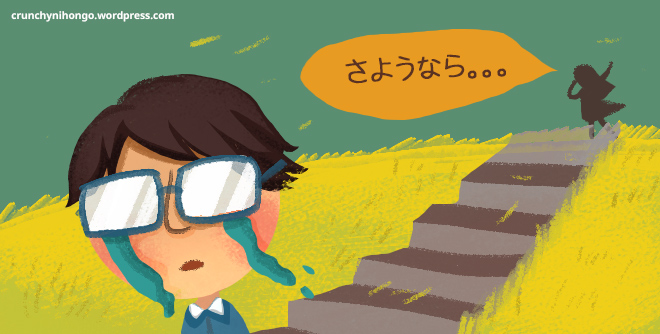
When it’s the final moment that you might see someone… If you’re not seeing someone for a long time, or to say good bye in polite manner, you say… さようなら – SAYOUNARA
…………………………………………..
If it’s not the final moment of goodbye… When you’re saying goodbye to a friend and want them to take care of themselves to come safely later, you say… おげんきで – OGENKI DE
…………………………………………..
If you’re going to see someone soon. Like “See you later!”. You say…
じゃ、また – JA,MATA .
You could add ね – (NE) in the back to be more casual & optimistic , like “See you later okay!”. So it becomes じゃ、また!JA, MATA NE!
…………………………………………..
If you’re going to see someone next day you say…
じゃ、またあした – JA,MATA ASHITA
You guess it, あした (ASHITA) means tomorrow. You could also add ね (NE) on the back of this greeting~
ARE YOU OKAY ? NO PROBLEM !
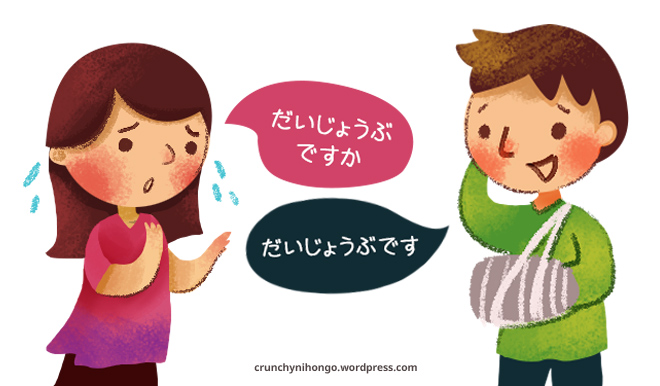
When you want to ask someone if they have a problem, you say… だいじょうぶですか – DAIJOUBU DESUKA?
And if they’re okay, they might reply with… だいじょうぶです – DAIJOUBU DESU
GREETINGS IN JAPANESE CULTURE
Below is a type of greetings that is a bit related to Japanese Culture, like the set-phrase you say when you’re about to eat.
THE FIRST MEETING
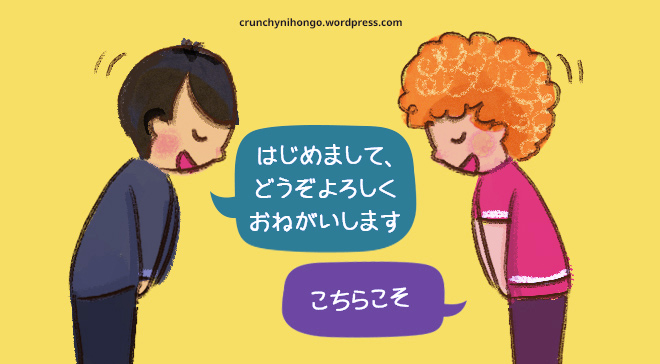
When meeting someone for the first time you say… はじめまして、どうぞうよろしくおねがいします – HAJIMEMASHITE, DOUZO YOROSHIKU ONEGAISHIMASU
And the proper reply would be…こちらこそ、どうぞよろしくおねがいします – KOCHIRA KOSO, DOUZO YOROSHIKU ONEGAISHIMASU
If it feels to long for you, simply reply with こちらこそ (KOCHIRA KOSO) will also do the work! And don’t forget to bow a bit while saying these 2 phrase 😀
HERE! THANKS! YOU’RE WELCOME~
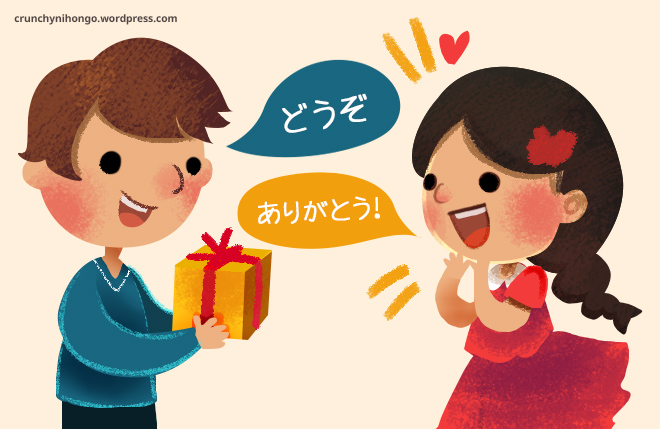
When you want to give something to someone its どうぞ – DOUZO
…………………………………………..
When you offer something to someone like offering your seat to elder,
It’s どうぞ – DOUZO
…………………………………………..
When a waiter give you your food,you guess it…!
They say どうぞ – DOUZO
…………………………………………..
And the receiver should says… ありがとうございます – ARIGATOU GOZAIMASU
Just ありがとう- ARIGATOU would work fine, but addingございます – GOZAIMASU makes it more formal. And adding どうも – DOUMO in front of it means “Thank you VERY MUCH”
Some people might also only reply with どうも – DOUMO, and will still mean the same, it’s an abbreviation. But どうも – DOUMO is used in a lot of different ways too, so it’s better to always reply with ありがとう to avoid any unnecessary misunderstanding.
…………………………………………..
YOU’RE WELCOME
Most of Japanese textbook will teach DOU ITASHIMASHITE to reply for a thank you… But most of the need would be casual and this word might be kinda too polite/formal… It’s like someone says to you “Thanks bro!” And you reply with “It’s my pleasure sir…”
So mostly we can reply a thanks with either だいじょうぶです – DAIJOUBU DESU
or just はい – HAI. There are a lot other word with the same meaning, but perhaps this is the simplest and easiest.

This is one of the phrase that you will use a lot while you’re staying in Japan. This word have a broad usage!
To apologise politely when you’re doing something bad you say すみません – SUMIMASEN.
Don’t forget to bow deeply to show that you really regret what you’ve done!
…………………………………………..
To say “Excuse me” while you’re walking in street/ want to get out of a train full of people. You walk through while saying すみません、すみません。SUMIMASEN, SUMIMASEN…
…………………………………………..
When you want to say “Thanks, sorry for the trouble”, you can say… ああ。すみません。AHH… SUMIMASEN… while bowing a bit and smile.
…………………………………………..
When you want to ask for help/ calling out for someone/waiters, you raise your hand and say すみません – SUMIMASEN~
…………………………………………..
Actually, there is a more formal phrase which means the same. It is しつれいします – SHITSUREI SHIMASU
But you will rarely use it when you travel. It’s usage is more for local people.
For example when:
• Entering classroom / someone else’s office room / entering a meeting room
• When you leave first than your co-worker
EATING IN JAPAN
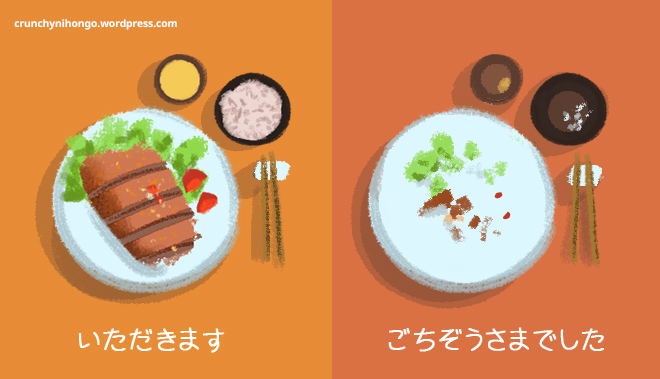
Japanese has a unique culture to say a set-phrase before & after eating.
Before eating you clap your hand while saying… いただきます – ITADAKIMASU
The meaning of this phrase is to be thankful for the food you about to eat.
…………………………………………..
While eating, if the food is good, you could say mmm! おいしい!- OISHII
おいしい (OISHII) means delicious. You could also say mmmm!! うまい!!(UMAI). Hold the M longer, so it sounds like “UMMAI!” It’s more casual, if translated, it might be similar to “YUMMY! or SO GOOD!”
…………………………………………..
And after you finished eating, you also clap your hand while saying… ごちぞうさまでした – GOCHIZOUSAMA DESHITA
Although to be the truth, you might not hear all of these phrase often when you go to Japanese public restaurant. Try to do all of this phrase when you’re in Japan, some Japanese might appreciate or happy to see a foreign saying them.
Some Japanese restaurant put you in front of the chef himself. They might smile at you when you say the 3rd word since it shows appreciation for the one who prepare the food, so when you got smiled on, don’t forget to send a smile back
WHEN VISITING A HOME
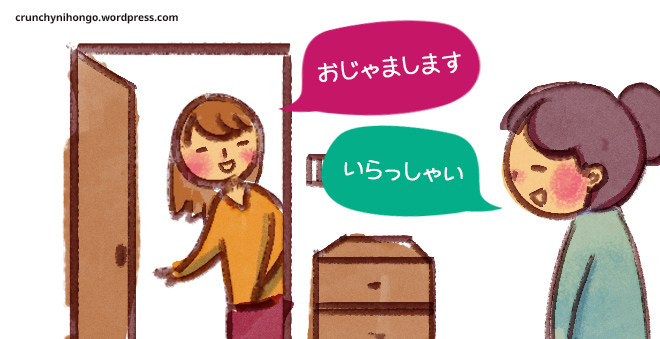
When you enter someone else’s property,say… おじゃまします – OJAMASHIMASU
…………………………………………..
And the owner will say…いらっしゃい – IRASSHAI to welcome you.
you might also hearいらっしゃいませ IRASSHAIMASE when you enter some store. But when entering store, you don’t have to do say anything, just walk confidently and smile 😀
WHEN YOU NEED HELP
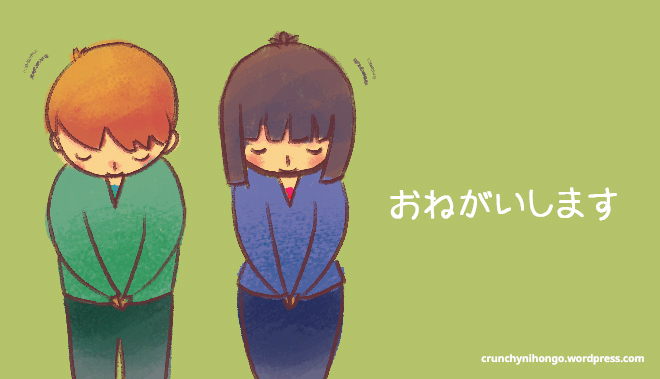
Either to make request or if you need help, the magic word is…
おねがいします – ONEGAISHIMASU
This might be the most useful set-phrase you will ever learn… Generally,it means “please…”
When you need anything, just check on the dictionary for the word of things you need, and add this magic word!!
FORMULA:
[What you need here] + ONEGAISHIMASU
For example… Water please! (water : MIZU)
and whoop~ they will get you a glass of water!
Replace water with almost any word you need…
Or if you don’t know the word, simply showing what you need with a hand/body sign (Tarzan mode) and add this magic word! And it should work like magic!…
SUMMARY OF THE MOST USEFUL PHRASE
If you don’t have a lot of time to learn, and you’re going to Japan.This is the summary of set phrase you will want to learn.
すみません – SUMIMASEN
Excuse me, Sorry, Thanks & sorry for troubling you
ありがとう – ARIGATOU
Thank you ! *say it while bowing your body a bit*
おねがいします – ONEGAI SHIMASU
It means “please”… Use this to ask for help. Add any word in front of it to request for anything you need while in Japan. Or simply showing what you need with a hand sign (Tarzan mode) and say this magic word! You will get what you need in no time!
いくらですか – IKURA DESUKA?
Asking for price. This isn’t listed above, but it’s super useful when you’re going to travel through Japan. Now, if you having trouble with Japanese number, after saying this, simply show them a digital calculator from your phone, and you should be able to know the exact price of the thing you want!
